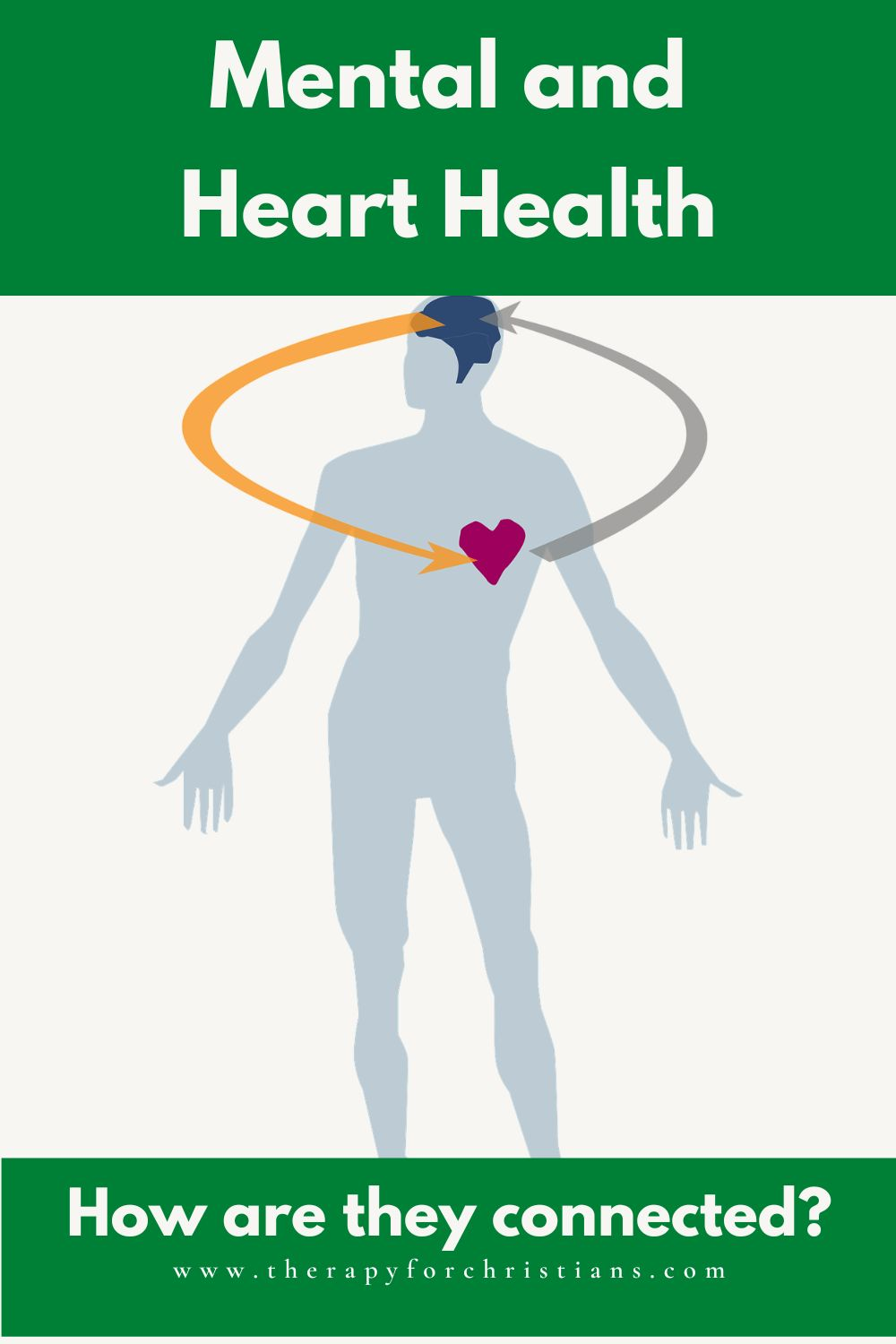

Heart disease is the leading cause of death in the United States, causing about one in four deaths, according to the Centers for Disease Control and Prevention. So it is natural that researchers are looking for ways to decrease cardiovascular disease and improve health health.
In their search for ways to decrease heart disease, researchers have discovered that the same biological and chemical factors that trigger mental health conditions like depression, can also influence your risk of heart disease. Specifically, there is a "growing body of research" that shows good mental health can reduce the risk of cardiovascular disease and improve overall heart health. Conversely, people with severe mental illness, including schizophrenia, bipolar disorder, and major depressive disorder, as a group, have an increased risk of developing cardiovascular disease.

Why It Is Important to Understand Mental Health's Impact on Heart Health
It is important to understand the impact of mental health on heart health for several reasons:
Early identification: By understanding the link between mental health and heart health, healthcare professionals can better identify individuals at risk for heart disease and provide early interventions to reduce the risk.
Better treatment: By understanding the impact of mental health on heart health, healthcare professionals can provide more effective treatment for individuals with both mental health conditions and heart disease.
Improved outcomes: By addressing both mental health and heart health, individuals are more likely to have better outcomes, including a reduced risk of heart disease and death.
Reduced healthcare costs: By addressing both mental health and heart health, the need for expensive medical treatments can be reduced, leading to lower healthcare costs.
Improved quality of life: By addressing both mental health and heart health, individuals can have an improved quality of life, as they are more likely to be able to manage their mental health condition and reduce the risk of heart disease.
Overall, understanding the impact of mental health on heart health is crucial to improve the overall health and well-being of individuals, and to reduce the burden of heart disease on society.

What Kinds of Mental Health Conditions Affect Heart Disease?
Some of the most commonly studied mental health disorders associated with heart disease or related risk factors include the following:
Heart Disease and Depression:
Depression the persistent feeling of sadness, loss and/or despair that can isolate you from the rest of the world. One of the symptoms of depression is a loss of pleasure and interest in pleasure activities and life. As a result, depression stops you doing your normal activities, including the things that protect you against heart disease (i.e., eating healthy and exercising).
In its severest form, clinical depression, this condition can not only increase the risk of heart disease but also worsen an existing condition. Research shows that while approximately 20 percent of us experience an episode of depression in our lifetimes, the figure climbs to 50 percent among people with heart disease. In fact, long-term studies reveal that men and women diagnosed with clinical depression are more than twice as likely to develop coronary artery disease or suffer a heart attack. In addition, heart disease patients with depression may face a higher risk for premature death as well as longer or more frequent hospitalizations.
Heart Disease and Anxiety Disorders:
Anxiety disorders result when people respond to certain objects or situations with fear, dread, terror, or worry. Anxiety disorders include generalized anxiety, social anxiety, panic disorders, and phobias.
Anxiety is a word we use to describe how we feel when we are worried or stressed. But it is more than that. When we are worried or stressed, the cortisol levels increase in your body. The increase in cortisol can lead to heart arrhythmia, high blood pressure, and heart damage.
Heart Disease and Post-traumatic Stress Disorder (PTSD):
People can experience PTSD after undergoing a traumatic life experience, such as war, natural disaster, or any other serious incident. PTSD patients may be always on guard for danger. These reactions trigger the body's "fight-flight-freeze" response to danger.
During the "fight-flight-freeze" response hormones are released, causing changes in the body's tissues and organs. These hormones raise blood pressure and boost heart rate. While the fight-flight-freeze response is a regular life-saving miracle that is built within us if we are in danger, activating this response too frequently can damage the artery lining and weaken the heart muscle.
Heart Disease and Substance Use Disorders:
Alcohol is a depressant and, as a result, can exacerbate feelings of hopelessness and anxiety. Excessive drinking also interferes with blood sugar, increases blood pressure, and can contribute to cardiomyopathy , a severe thickening of the heart muscle. Similarly, smoking is proven to have detrimental effects on heart health.
Related: Understand substance use disorders and it's treatment
Heart Disease and Stress:
Stress can increase cortisol levels, leading to heart arrhythmia, high blood pressure, and heart damage. Prolonged exposure to stress can cause increased mental and physical health problems as a result. The effects of stress can lead to headaches, chest pain, sleep problems, anxiety, and more. All these effects can have a negative impact on heart health and mental well-being.
It's also important to note that people with mental health conditions may also have other risk factors for heart disease, such as smoking, a lack of physical activity, and poor diet, which can also contribute to the development of heart disease.
Reducing Your Risk Factors For Heart Disease
While the link between mental illness and heart disease may seem like bad news, there is some good news. The habits we engage in to positively impact our mental health also have a positive affect on our hearts. Similarly, the healthy lifestyle practices we engage in to protect our heart can impact you mental health. To keep your heart and mental health good and healthy, you can take a few initiatives.
Related: What Techniques to Manage Stress do Mental Health Therapists Recommend
Mindfulness and meditation have been proven to be helpful for mental health and heart health. Meditation helps to reduce anxiety, brings calmness and relaxation to mind and lowers blood pressure.
Routine exercise benefits both your body and mind because it releases feel-good endorphins, which can help to alleviate depression and stress. It helps improve cardiovascular health, resulting in lowered blood pressure and cholesterol. Staying active also boosts serotonin levels, contributing to enhanced mood. Even mild exercise, such as doing a walking meditation, has a profound effect on anxiety and depression. One study suggests that a quick daily walk can reduce major depression risk factors by 26%.
Another essential thing is to practice journaling. Psychologists found that journaling is as effective as talk therapy; in some cases. For people who are engaging in therapy, journaling can enhance traditional therapy.
Getting 7 to 9 hours of uninterrupted sleep has proven health and stress reduction benefits. Reducing stress increases ability to sleep and your mental health and decreases your risk of a heart disease.
The American Heart Association is also recommending mental health screening for people who see a cardiologist for any reason. If you are going to a cardiologist, make sure they are just not listening to your heart but also asking you how you are feeling on an emotional level. Similarly, your primary care physicians should also be giving you check-ups from the neck up.
While the risk factors for developing heart disease and mental health disorders are very similar, healthy lifestyle adjustments can help both conditions.
Final Thoughts on Mental Health and Heart Disease
If feelings of sadness, depression, anxiety and fear negatively impact your life, there are Christian mental health providers specifically trained to help you. There is no shame in asking for help from them. Because this is the exact reason, they are there. Talk therapy, psychotherapy, even in some cases, medications all are important.
Remember that if you are already suffering from mental illness, addiction, or trauma, the activities listed above may be beneficial; but, they will most likely not be sufficient to address your mental illness or addiction. If you need help with an existing mental illness, seek professional help. You can search our directory for a qualified provider for a local Christian therapist.
About the Author:
 Corine Williams, Ph.D. is Clinical Psychologist that is currently seeing clients in the States of Maryland, New Jersey, and New York. You can find out more about her practice by visiting www.therapyforchristians.com/corinewilliams. In addition to providing individual therapy, Dr. Williams is also passionate about writing books and designing merchandise that educate, uplift, and normalize mental health subject in the Christian community. You can find out more about her at www.booksbycorine.com or by visiting her amazon profile here: https://www.amazon.com/Corine-Hyman/e/B00AWZ5FL2
Corine Williams, Ph.D. is Clinical Psychologist that is currently seeing clients in the States of Maryland, New Jersey, and New York. You can find out more about her practice by visiting www.therapyforchristians.com/corinewilliams. In addition to providing individual therapy, Dr. Williams is also passionate about writing books and designing merchandise that educate, uplift, and normalize mental health subject in the Christian community. You can find out more about her at www.booksbycorine.com or by visiting her amazon profile here: https://www.amazon.com/Corine-Hyman/e/B00AWZ5FL2
Help us increase mental health awareness in the Christian community by donating through our paypal link here: www.paypal.com/therapyforchristians, joining our mailing list by clicking below, or join our provider list here: Provider listing
Disclaimer: the information, including but not limited to, text, graphics, images and other material contained on this article are for informational purposes only. No material on this site is intended to be a substitute for professional medical advice, diagnosis or treatment. If you are looking for a Christian counselor near you, please check out our directory located here: Christians Therapist Near Me
.png)


.jpg)








